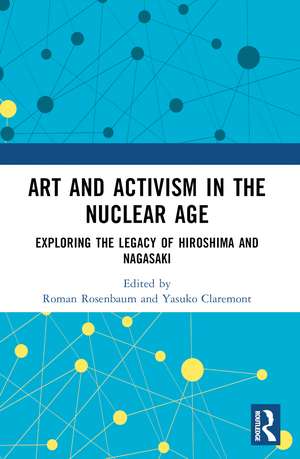Art and Activism in the Nuclear Age: Exploring the Legacy of Hiroshima and Nagasaki
Editat de Roman Rosenbaum, Yasuko Claremonten Limba Engleză Paperback – 7 oct 2024
It closely interrogates the political and cultural shifts that have accompanied the transition to a nuclearised world. Beginning with the contemporary socio-political and cultural interpretations of the impact and legacy of the destruction of Hiroshima and Nagasaki, the chapters examine the challenges posed by committed opponents in the cultural and activist fields to the ongoing development of nuclear weapons and the expanding industrial uses of nuclear power. It explores how the aphorism that "all art is political" is borne out in the close relation between art and activism.
This multi-disciplinary approach to the socio-political and cultural exploration of nuclear energy in relation to Hiroshima/Nagasaki via the arts will be of interest to students and scholars of peace and conflict studies, social political and cultural studies, fine arts, and art and aesthetic studies.
| Toate formatele și edițiile | Preț | Express |
|---|---|---|
| Paperback (1) | 261.46 lei 6-8 săpt. | |
| Taylor & Francis – 7 oct 2024 | 261.46 lei 6-8 săpt. | |
| Hardback (1) | 895.81 lei 6-8 săpt. | |
| Taylor & Francis – 12 mai 2023 | 895.81 lei 6-8 săpt. |
Preț: 261.46 lei
Preț vechi: 312.20 lei
-16% Nou
Puncte Express: 392
Preț estimativ în valută:
50.03€ • 52.13$ • 41.42£
50.03€ • 52.13$ • 41.42£
Carte tipărită la comandă
Livrare economică 03-17 aprilie
Preluare comenzi: 021 569.72.76
Specificații
ISBN-13: 9781032340685
ISBN-10: 1032340681
Pagini: 286
Ilustrații: 90
Dimensiuni: 156 x 234 mm
Greutate: 0.53 kg
Ediția:1
Editura: Taylor & Francis
Colecția Routledge
Locul publicării:Oxford, United Kingdom
ISBN-10: 1032340681
Pagini: 286
Ilustrații: 90
Dimensiuni: 156 x 234 mm
Greutate: 0.53 kg
Ediția:1
Editura: Taylor & Francis
Colecția Routledge
Locul publicării:Oxford, United Kingdom
Public țintă
Academic, Postgraduate, and Undergraduate AdvancedCuprins
1. Introduction: The Raison D’être of the Arts in the Nuclear World 2. Anti-Nuclear Movements and Education for Peace and Human Rights 3. Interrogating the Nuclear Industry, Local and Global: Tsushima Yūko’s Post-3.11 Writing 4. Contemporary Perspectives on the Nuclear World, Seventy-Five Years after Hiroshima and Nagasaki: Manga as Nuclear Art 5. Anti-Nuclear Activism Through the Arts in Japan 6. Hiroshima Museums: Atomic Artifacts on the Seventy-fifth Anniversary 7. Silence and Resilience: Commemorating Nagasaki Alongside the ‘Extraordinary Noise’ of the Olympics and Under the Covid-19 ‘Mushroom Cloud’ 8. An Apocalypse Through Australian Eyes: the Art and Objets Trouvés of Occupied Hiroshima 9. Genbaku Legacy in Post-3.11 Japan: Ōta Yōko and Yoshida Chia 10. The Unquiet Legacy of Nuclear Testing in French Polynesia 11. Scientific Activism in the Nuclear Age: Atuhiro Sibatini and the Ranger Uranium Mine 12. Epilogue: Celebrating Nuclear Activism and the Power of the Individual
Notă biografică
Roman Rosenbaum, PhD is an Honorary Associate at the University of Sydney, Australia. He specialises in Postwar Japanese Literature, Popular Cultural Studies and translation. His latest research publication includes The Representation of Japanese Politics in Manga:The Visual Literacy of Statecraft (Routledge, 2020).
Yasuko Claremont, PhD in Japanese literature, Honorary Senior Lecturer at the University of Sydney, was curator for the exhibition, Art and Activism in the Nuclear Age, April/May 2022 at the Tin Sheds Gallery. Her forthcoming book, The Asia Pacific War: Impact, Legacy, and Reconciliation, will be published by Routledge.
Yasuko Claremont, PhD in Japanese literature, Honorary Senior Lecturer at the University of Sydney, was curator for the exhibition, Art and Activism in the Nuclear Age, April/May 2022 at the Tin Sheds Gallery. Her forthcoming book, The Asia Pacific War: Impact, Legacy, and Reconciliation, will be published by Routledge.
Descriere
This book explores the contemporary legacy of Hiroshima and Nagasaki following the passage of three quarters of a century, and the role of art and activism in maintaining a critical perspective on the dangers of the nuclear age.
